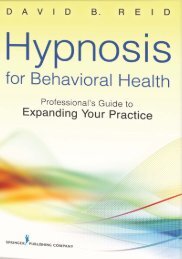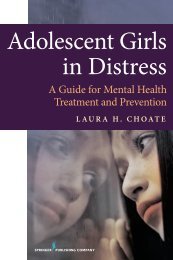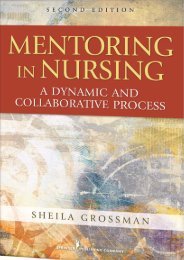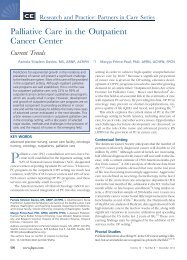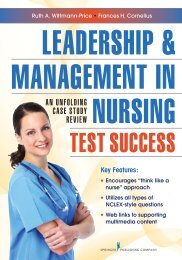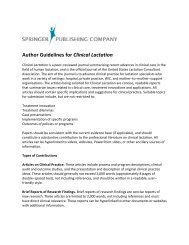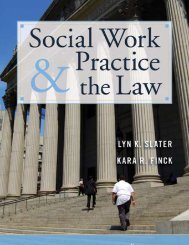Popular Culture in Counseling, Psychotherapy, and Play-Based ...
Popular Culture in Counseling, Psychotherapy, and Play-Based ...
Popular Culture in Counseling, Psychotherapy, and Play-Based ...
Create successful ePaper yourself
Turn your PDF publications into a flip-book with our unique Google optimized e-Paper software.
xxvi FOREWORD<br />
the mob fi gures so powerfully del<strong>in</strong>eated that real-world mobsters started<br />
behav<strong>in</strong>g like characters from the movies after hav<strong>in</strong>g become mesmerized<br />
<strong>and</strong> immersed <strong>in</strong> the fi rst two fi lms.<br />
The fi lms’ Corleone family members <strong>and</strong> their relationships are written<br />
<strong>and</strong> acted with such unerr<strong>in</strong>g skill that most people watch<strong>in</strong>g the<br />
fi lms fi nd themselves identify<strong>in</strong>g with one or the other of the Corleone<br />
brothers, or with adopted brother Tom Hagen, or with sister Connie.<br />
Everyone has, at some time, been the wild <strong>and</strong> crazy child, the angry,<br />
resentful child, the good child with, we fear, the capacity for evil beneath<br />
the socially acceptable façade.<br />
Interest<strong>in</strong>gly, the Godfather fi lms have become some of the most<br />
powerful family dramas of our age, br<strong>in</strong>g<strong>in</strong>g the mob families’ drama<br />
to the level of Shakespeare or opera (both of which, though considered<br />
highbrow now, were, at the time of their orig<strong>in</strong>al presentation, considered<br />
TV-like popular culture). The Godfather movies take the extreme<br />
highs <strong>and</strong> lows of family life <strong>and</strong> extend them to a worldview that, <strong>in</strong> the<br />
case of even the “noble” Corleones, is essentially a justifi cation for cynical,<br />
violent, crim<strong>in</strong>al activity.<br />
Still, a fi ctional world that is so well known <strong>and</strong> so mov<strong>in</strong>g to so<br />
many must surely have a therapeutic use, even as a cautionary tale. Has<br />
there ever been so mov<strong>in</strong>g a father-son scene as when Marlon Br<strong>and</strong>o’s<br />
Don Vito Corleone warns son Michael (Al Pac<strong>in</strong>o) about who he can<br />
<strong>and</strong> can’t trust <strong>in</strong> upcom<strong>in</strong>g <strong>in</strong>termob negotiations? Vito expresses tearful<br />
regret that his son has to engage <strong>in</strong> the ugly bus<strong>in</strong>ess of organized crime,<br />
that Michael has <strong>in</strong>herited his mantle of leadership. “I never wanted<br />
this for you, Michael. It should have been ‘Senator Corleone,’ ‘Governor<br />
Corleone.’ There just wasn’t enough time.” And what does Michael<br />
reply? Why, what every father would want his son to say after a confession<br />
of failure: “We’ll get there, Pop.” And when Michael says, “We’ll get<br />
there,” he doesn’t just mean the Corleone family, he means, by extension,<br />
every immigrant group, <strong>and</strong> beyond that, every person who ever chased<br />
a dream. “We’ll get there.” And, expressed beneath that is yet another<br />
mean<strong>in</strong>g, the idea that Michael’s children won’t have to be gangsters, that<br />
they’ll “get there,” to a promised l<strong>and</strong> where they can be just Americans,<br />
just regular people, without the life-warp<strong>in</strong>g burden of the power <strong>and</strong> responsibility<br />
of runn<strong>in</strong>g a crim<strong>in</strong>al empire. Perhaps “We’ll get there” can<br />
even be taken to refer to arriv<strong>in</strong>g at a state of psychological health, where<br />
one’s <strong>in</strong>ner <strong>and</strong> outer life can fi nally be <strong>in</strong> some k<strong>in</strong>d of balance.<br />
Of course, without proper guidance—<strong>in</strong>ternal or external—the message<br />
of The Godfather, like the message of Star Wars, could be <strong>in</strong>terpreted<br />
by a child or adolescent as: “Nobody messes with the toughest,<br />
most ruthless kid on the block. So if you’re not go<strong>in</strong>g to be that kid,<br />
you’re screwed.” These aren’t just issues for kids <strong>in</strong> therapy, but for our



